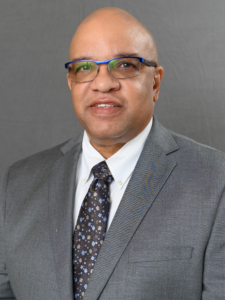
Austin Community College District (ACC) welcomes Dr. Eric Nathan (he/him/his) as the Teaching & Learning Excellence Division’s (TLED) new dean of Faculty Development and Evaluation. In this role, Nathan will oversee faculty development programs and faculty evaluation processes at ACC.
Nathan brings more than 25 years of experience working directly with faculty in the areas of faculty development, distance education, instructional design, instructional technology, and multimedia development. He has worked at two- and four-year institutions throughout Texas, most recently at Lone Star College.
Nathan also has more than 14 years of experience teaching graduate and undergraduate courses as an adjunct instructor. He holds a Doctorate of Education in Curriculum & Instruction with a focus on Instructional Technology from the University of Houston-Central, a Master of Arts degree in Humanities from the University of Houston-Clear Lake, and a Bachelor of Arts degree in Communications, Radio & Television from the University of Houston-Central.
Learn more about Nathan below and welcome him to the college via email at [email protected].
Where did you grow up?
I grew up in Mobile, Alabama, but after visiting a cousin in Houston between my sophomore and junior year of high school, I asked my mom if I could finish high school in Houston because I liked it so much. During my senior year of high school, I participated in a program called Industrial Cooperative Training (ICT). I went to school until noon and then worked a full-time job from 1 – 9 p.m. where I worked on an assembly line and learned how to build computers. I got my start working in technology in the mid-seventies.
What do you consider to be your purpose?
I’ve always wanted to focus not just on learning but on imparting that knowledge to the younger generation. I have the chance to do that now while raising three kids. I feel I was put here to be a mentor. I’m passionate about helping the younger generation build a foundation and maybe avoid some of the mistakes I made as a teenager. I was fortunate enough to have several mentors in my life who took me under their wings and sat down with me to have meaningful conversations about life and the choices we make.
What else are you passionate about?
I have an affinity for music, specifically audio production. My lifelong goal coming out of high school was to create soundtracks for film and television. I wanted to be a Henry Mancini and Quincy Jones clone. I have a MIDI home studio for audio production and video production equipment complete with a green screen. Over the years, I’ve produced public service announcements, commercial jingles, and demo tapes with local bands. I love creating rich media content.
You worked at Houston Community College for eight years, Lone Star College for nine years, and now you’re here at Austin Community College. Why do you choose to work at community colleges?
Well, community college was my path. After high school, I went to trade school to get my certificate and then to community college. I’ve always thought community college was a nice steppingstone; a nice way to transition into a four-year college. Particularly for students of color or underprivileged students who have not necessarily been prepared for a four-year college or university. In fact, some of them feel defeated, and they feel they don’t measure up while in college.
How do you foster belonging in the classroom as an instructor and/or on your team as a manager?
I try to make both my students and staff an active part of the process — the process of teaching and learning for my students, and the day-to-day decision-making process in the work environment. In a work environment, during meetings, I don’t want to be the only one talking, so I try to involve everyone by allowing everyone to give updates. I try to engage everyone so I’m not just a talking head. It’s the same thing in the classroom. I’m not here to be a sage on the stage. I want my students to be an active part of the teaching and learning process.
How do you engage students in the online environment?
It’s important to remember that in an online course, students are sitting on an island by themselves. Many scholars have noted over the years, there are three types of interactions we should promote in online environments: student-to-teacher, student-to-student, and student-to-content. I try to think about the material in terms of those interactions since I have primarily taught online.
I have always started my courses with an introductory video so students see me, and they can put a name with a face. I’m not just a name or figurehead giving them assignments each week. I also look for opportunities for collaboration between students, to get them talking to each other. As for the materials, research shows that materials with rich media content help you engage best with your students.
What are your goals for your new role as Dean of Faculty Development and Evaluation?
I want to understand what we’re doing first, because I don’t want to be a disruptive force. I want to come in, fit in, and collectively figure out what we’re doing right and what we can improve. We all know our goal is student success. With input from students, faculty, and staff, we can work toward this goal. I know there will be rough waters ahead, but I’m prepared for that. My mantra is, I roll up my sleeves, and I go to work.
